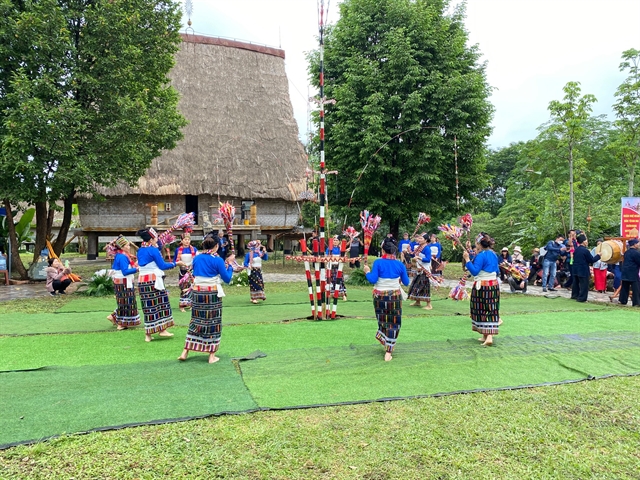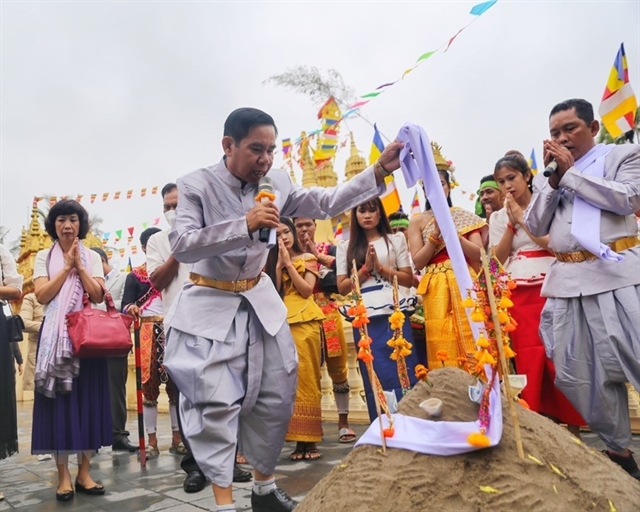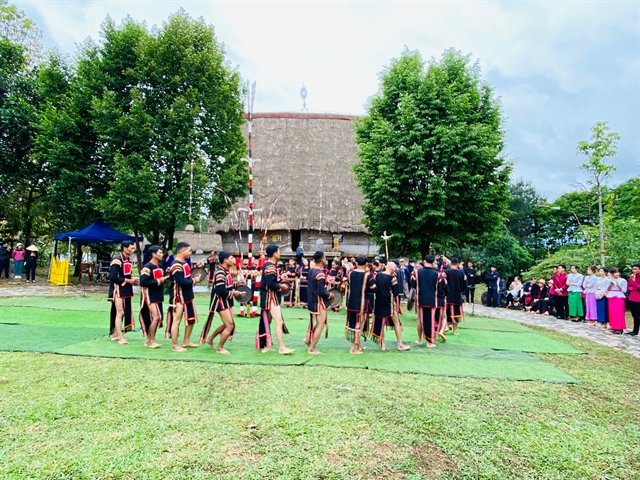Lê Hương & Bảo Hoa
HÀ NỘI — President Nguyễn Xuân Phúc yesterday had a meeting with 92 representatives from ethnic groups at the Presidential Palace on Vietnamese Ethnic Groups’ Culture Day (April 19).
The representatives included elders, heads of villages and artisans, who have prestige and play active roles in their communities.
The President confirmed that the task of preserving the spiritual and material life of ethnic minority people has been more and more improved, especially projects and policies on bringing into full play the cultural values of ethnic groups as a non-removable part of Vietnamese culture.
The President recalled the speech of Party General Secretary Nguyễn Phú Trọng at the National Culture Conference in November 2021: “People will remain if culture remains”.
“Culture is the core soul of people, generations of Vietnamese must keep great solidarity, preserve and develop culture together with developing socio-economy and ensuring self-defence and security for the country,” he stressed.
The President highly appreciated the culture ministry and concerned agencies to host various meaningful activities at the Việt Nam National Village of Ethnic Culture and Tourism, a common house of ethnic groups.
“Unique festive events, traditional arts, customs that have been recognised as humankind’s representative intangible heritage and national intangible heritage performed by local artisans, elders and heads of villages,” he said.
The President highlighted the role of elders, artisans and heads of villages, who have kept ‘the fire’ in villages and acted as bridges between local authorities and people in enhancing great solidarity, poverty eradication and building new rural areas.
President Phúc asked concerned agencies to better care for the life of prestigious people in ethnic communities and facilitate them to join in socio-economic development.
They should be kept updated with information, knowledge and skills to better fulfil their tasks, he said.
The President stressed the need to focus on poverty eradication, improving locals' life and reducing poor households.
The President hopes prestigious people live as bright examples for their offspring and communities in local economic development, preserving traditional cultures, arts and educating the youth.
“Through cultural connections, we will get close to one another, understand and love one another to enhance Vietnamese strength and Vietnamese value for today and the future,” he said.
He asked concerned agencies to better fulfil the task of educating and encouraging ethnic minority people to learn the Vietnamese language and preserve their own languages.

Art shows in the village attract many audiences. — VNS Photo Lê Hương
Ethnic colours
At the Việt Nam National Village for Ethnic Culture and Tourism in the western outskirt of Hà Nội, people will see a bustling atmosphere throughout the large area where hundreds of representatives from various ethnic minority groups gather to celebrate the annual Vietnamese Ethnic Groups’ Culture Day.
Various traditional rituals, festivals, folk songs and dances are replicated at the destination including the peace wish ceremony of the Tày ethnic group of Thái Nguyên, Chôl Chnăm Thmây Festival of the Khmer group; Kin chiêng boọc mạy of the Thái group and harvest celebration ceremony of Gia Rai group.
Vi Thị Giáo, 65, a dancing artisan from the central province of Thanh Hóa, could not hide her pride and happiness performing her traditional dance titled Múa Cây Bông in the village together with her local team.

The Múa Cây Bông folk dance by Thái group from Thanh Hóa Province. — VNS Photo Lê Hương
“We often perform this dance at traditional festive events, especially the 10th day of the first lunar month, to pray for good weather all the year round and good luck for people,” she told Việt Nam News. “For the past two years, due to the pandemic, we cannot practice and perform it at any event.
“I learnt the dance from my grandparents,” she said. “Now I teach it to younger people as an effort to preserve our traditional identity.”
Giáo said she has not found any obstacles in handing the dance to younger generations.
“The middle-aged people have more time so they are more active in learning than younger people,” she said.
Visitor Tô Xuân Quỳ, 78, from nearby Sơn Tây Town said he visits the village to see the activities of the event every two years.
“The village showcases the origin of our people,” he said. “If we visit a locality, we just visit one ethnic group at once. But here we can find cultures of 54 ethnic groups. Today, I can see dances of the Thái group from the central province of Thanh Hóa and songs by Gia Rai group from the central highlands. I’m very happy.”
Artisan Thạch Chăm Rơn, head of Khmer Art Troupe from the southern province of Sóc Trăng, said the 13-member troupe offers a custom replica of a traditional festival and a performance of songs and dances.

Khmer representatives perform Chôl Chnăm Thmây Festival at the village. — VNA/VNS Photo Tuấn Đức
“The customs are restaged the same as traditional manners at our home,” he said. “We can exchange with other ethnic groups and show off the beauty of the Khmer ethnic group to them.”
Rơn said local traditional culture has been well preserved by the youth as well as concerned agencies.
Trịnh Ngọc Chung, Acting Head of the village’s Managing Board, said the highlights of the event include a forum on bringing into play ethnic cultures in building environments, where culture managers and scientists discussed theory and practice for localities and our village to plan activities following the ministry’s guidelines in preserving ethnic cultures. The second highlight includes festivals, customs and art shows of various ethnic groups by local artisans.
Chung said in the past two years, the culture minister has tried his best to propose special mechanisms for the village to turn it into a place for preserving ethnic cultures and for educating patriotism, national pride and solidarity of ethnic groups.
“We are completing infrastructures in the village,” he said. “We will co-operate with localities to showcase ethnic cultures in the village. We will enhance the quality of the performances. We aim to invite local artisans, who are holding knowledge and traditional cultures of ethnic groups and represent local cultural values. We encourage initiations and creations among staff working at the village to serve ethnic groups’ representatives and visitors better.” VNS

A dance by the Ê Đê group at the village. — VNS Photo Lê Hương
OVietnam